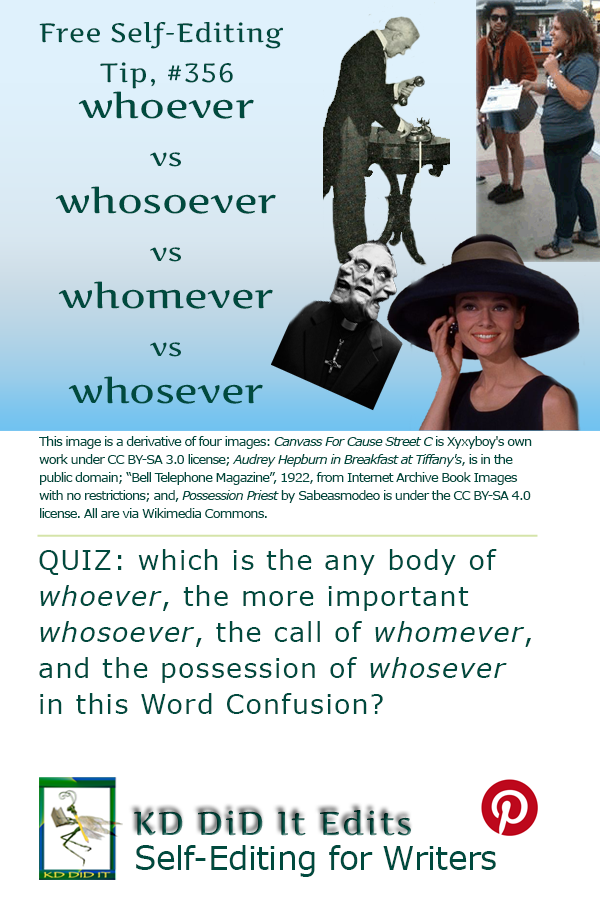Choosing between who- and whoso- versus whom- is definitely tricky. The key is to remember that whoever and whosoever form the subjective case and are used in the subject position in a sentence when a verb is conjugated or includes a linking verb.
Whomever forms the objective case and is used in the object position in a sentence: the object of the verb or the preposition.
Whosever is used in the possessive case.
The Subjective Whoever, Whosoever
If the verb in the sentence has a tense, then it must have a subject, which means that word is always in the nominative/subjective case, so it’s whoever or whosoever.
Test For It
- Green indicates the subjective pronoun + verb
- Coral indicates the subjective pronoun + linking verb
- Pale green indicates the subject of the clause stays with the clause
- Blue indicates the verb to which whomever is the object
- Purple indicates the preposition to which whomever is the object
verb
You can use one of several ways to decide if you should use whoever or whomever:
- Slip in the I, he, she, we, they and the me, him, her, us, them and see which suits best, or
- Determine if whoever or whomever is the subject or the object in the sentence, or
- The subject of a clause is always attached to that clause — no matter what, or
- Chicago suggests a trick: switch whoever with anyone who (“who”) and anyone (“whom”) (Chicago, 5.63), or
- Substitute the personal pronouns noted in the table below — you may have to rewrite the sentence as part of the test
| Choose Which Best Suits . . . | |
|---|---|
| Nominative, a.k.a., Subjective Case |
Objective Case |
| Subject of a sentence with a conjugated verb | Object of a verb or preposition |
| who/whoever = I, he, she, we, they | whom/whomever = me, him, her, us, them |
|
[You] give the correspondence to she. |
Give the correspondence to whomever.
[You] give the correspondence to her. |
| Whoever brought these brownies to the party should be commended!
He brought these brownies to the party. He should be commended! |
Him brought these brownies to the party. Him should be commended! |
| I decided to vote for whoever called me first.
. . . he called me first. |
I decided to vote for him called me first. |
| Give it to whoever deserves it.
“[You] give it to he who deserves it” or “he deserves it.” |
“[You] give it to him who deserves it” or “him deserves it”. |
| Whoever wants it can have it.
Filling in the elliptical clause, it becomes “he who wants it, he can have it (joining these two simple sentences is one of those comma splice exceptions). |
[Him] wants it, [him] can have it. |
| Whoever is hungry can have the leftover pizza.
[He] is hungry. |
[Him] is hungry. |
| Give the package to whoever comes for it.
[You] give the package to him [he comes for it]. |
[You] give the package to him [him comes for it]. |
| I am happy with whoever wins.
I am happy with him [he who wins]. |
I am happy with him [him who wins]. |
| Give the book to whoever wants it.
[You] give the book to him [he wants it]. |
[You] give the book to him [him wants it]. |
| Ask whoever reads that book to answer the question.
[You] ask him [he reads that book] to answer the question. |
[You] ask him [him reads that book] to answer the question. |
|
Kate marries he |
Whomever Kate marries is none of our business.
Kate marries him |
|
You choose he |
Please invite whomever you choose.
You choose him |
|
Dale selects she |
I am eager to work with whomever Dale selects as my partner.
Dale selects her |
|
Human Resources recommends he |
Whomever Human Resources recommends as a consultant, we will still need to interview him or her.
Human Resources recommends him |
|
Jon introduces me to he |
I will be glad to meet whomever Jon introduces me to.
Jon introduces me to him |
Other “Who” Posts
To avoid confusions, there are other posts that explore the who versus . . . question, including:
- “Who ‘Dat?” mostly explores who versus that but does include a bit on whom and whose
- “Who versus Whom“
- “Who’s versus Whose“
Word Confusions . . .
. . . started as my way of dealing with a professional frustration with properly spelled words that were out of context in manuscripts I was editing as well as books I was reviewing. It evolved into a sharing of information with y’all. I’m hoping you’ll share with us words that have been a bête noire for you from either end.
If you found this post on “Whoever vs Whosoever vs Whomever vs Whosever” interesting, consider subscribing to KD Did It, if you’d like to track this post for future updates.
| Whoever | Whosoever | Whomever | Whosever |
|---|---|---|---|
 |
 — |
 — |
 — |
| Part of Grammar: | |||
| Subjective Pronoun; Compound Relative Pronoun
Also who ever |
Compound Relative Pronoun | Objective Pronoun; Compound Relative Pronoun |
Possessive Pronoun; Compound Relative Pronoun |
Whoever is one who acts and is the:
If using in an emphatic sense, whoever may also be spelled who ever Pronoun: Used for emphasis instead of who in questions, typically expressing surprise or confusion
Relative Pronoun:
Whatever person
No matter who [Literary contraction] whoe’er |
Formal term for whoever | Whomever is acted upon
Chiefly formal or literary Used instead of whoever as the object of a verb or preposition |
Rare form of:
[As adjective] Belonging to or associated with whichever person The one or ones belonging to whomever |
| Examples: | |||
| Pronoun: Whoever would want to make up something like that? I won’t do it, whoever asks. Whoever does he think he is? Who ever does he think he is? Relative Pronoun: Ask whoever is there. Come out, come out, whoever you are. Whoever did it hated him. |
They have a belief that whosoever steals shall be blinded.
“. . . knighthood ennobles, inasmuch that whosoever is a Knight, it necessarily follows that he is also a gentleman . . .” (Tagore). “Whosoever is delighted in solitude is either a wild beast or a god.” – Aristotle |
Tell it to whomever you like.
She questioned whomever she met. Whomever she spoke to, she was invariably polite. I’ll hire whomever I can find. I’ll sing whatever I like to whomever I like. |
The choice, whosever it was, is interesting.
She dialed whosever number she could still remember. Whosever wagon this is, get it out of here. Whosever is this ridiculous hat? Whosever will win, do you think? Whosever book you use, you must take care of it. |
| History of the Word: | |||
| Late Old English, 1125–75, hwa efre. | The first known use was in the 13th century. | Middle English, 1300–50. | 1730–40 |
C’mon, get it out of your system, bitch, whine, moan . . . which words are your pet peeves? Also, please note that I try to be as accurate as I can, but mistakes happen or I miss something. Email me if you find errors, so I can fix them . . . and we’ll all benefit!
Satisfy your curiosity about other Word Confusions on its homepage or more generally explore the index of self-editing posts. You may also want to explore Book Layout & Formatting Ideas, Formatting Tips, Grammar Explanations, Linguistics, Publishing Tips, the Properly Punctuated, Writing Ideas and Resources, and Working Your Website.
Resources for Whoever vs Whosoever vs Whomever vs Whosever
Some of these links may be affiliate links, and I will earn a small percentage, if you should buy it. It does not affect the price you pay.
Apple Dictionary.com
Chicago Manual of Style. Chicago: University of Chicago Press, 2003. Print.
Collins Dictionary: whosever
Dictionary.com: whoever, whomever, whosever
Tagore, Sourindro Mohun. The Orders of Knighthood, British and Foreign: With a Brief Review of the Titles of Rank and Merit in Ancient Hindusthan. Wentworth Press, 2019. Paperback. <https://amzn.to/3MzPzjq>.
“Tricky Pronouns: Whoever and Whomever.” Business Writing Blog. April 2013. Web. n.d. <http://www.businesswritingblog.com/business_writing/2013/04/tricky-pronouns-whoever-and-whomever.html#sthash.CkI439d8.dpuf”>.
“Whoever vs Whosoever vs. Whomever.” Grammarly.com. n.d. Web. n.d. <https://www.grammarly.com/blog/2-effective-ways-to-deal-with-whoeverwhomever-confusion/>. This is a useful post using the pronoun test on determining whether one should use whoever or whomever.
Pinterest Photo Credits
Canvass For Cause Street C is Xyxyboy’s own work under the CC BY-SA 3.0 license is the whoever, the any body; “Bell Telephone Magazine“, 1922, from Internet Archive Book Images with no restrictions is my concept of whomever; I see Audrey Hepburn in Breakfast at Tiffany’s, a trailer screen shot in the public domain, as whosoever, a more important any body; and, the possessive whosever made me think of someone possessed . . . bwah-ha-ha, which led me to Possession Priest by Sabeasmodeo, which is under the CC BY-SA 4.0 license. All are via Wikimedia Commons. The first two have been cropped, and the backgrounds on the latter three have been removed.
Revised as of 21 Apr 2024
By: Kathy Davie

